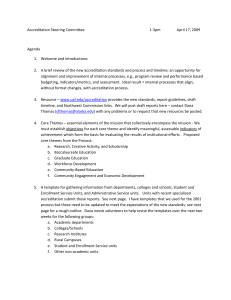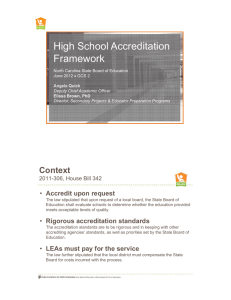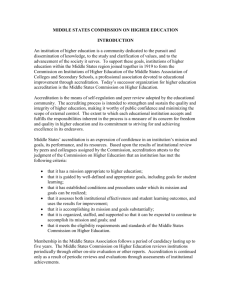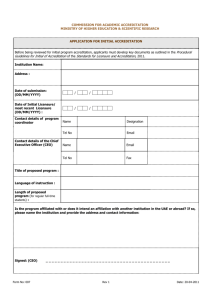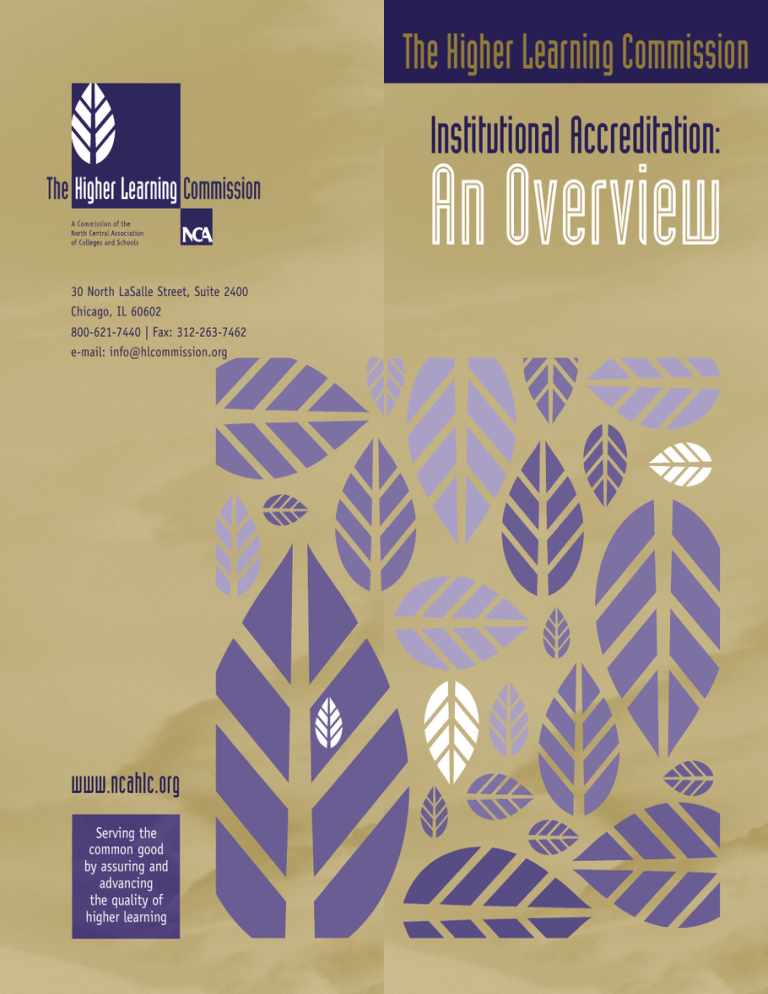
The Higher Learning Commission
Institutional Accreditation:
An Overview
30 North LaSalle Street, Suite 2400
Chicago, IL 60602
800-621-7440 | Fax: 312-263-7462
e-mail: info@hlcommission.org
www.ncahlc.org
Serving the
common good
by assuring and
advancing
the quality of
higher learning
The Higher Learning Commission
Institutional Accreditation:
An Overview
Introduction
1
The North Central Association
1
The Higher Learning Commission
2
Commission Personnel
2
Commission Programs and Services
3
Forms of Affiliation
3
The Evaluation Process
4
The Criteria for Accreditation
5
Seeking Initial Status
7
The Candidacy Program
7
Obligations of Affiliation
8
Information Available to the Public
8
Complaints Against an Affiliated Organization
8
Complaints Against the Commission
9
Frequently Asked Questions
10
For More Information
13
Publications
14
On the Commission’s Web Site
14
The information contained in this
document is accurate as of March 1, 2007.
Note: At the time of this publication, it appears likely that
changing federal expectations may cause the Commission to
change some aspects of its accreditation processes.
Institutions should consult the Commission office and/or its
Web site for the most current policies and procedures.
Entire contents copyright 2007 by
The Higher Learning Commission, a commission of the
North Central Association of Colleges and Schools.
All rights reserved.
The Higher Learning Commission | Institutional Accreditation: An Overview
1
Introduction
In the United States, schools and colleges voluntarily seek
accreditation from nongovernmental bodies. There are
two types of educational accreditation: institutional and
specialized.
Institutional accreditation is provided by regional and national
associations of schools and colleges. There are six regional
associations, each named after the region in which it operates
(Middle States, New England, North Central, Northwest,
Southern, Western). The regional associations are independent
of one another, but they cooperate extensively and acknowledge one another’s accreditation. Several national associations
focus on particular kinds of institutions (for example, trade
and technical colleges, and religious colleges and universities).
An institutional accrediting agency evaluates an entire educational organization in terms of its mission and the agency’s
standards or criteria. It accredits the organization as a whole.
Besides assessing formal educational activities, it evaluates
such things as governance and administration, financial stability, admissions and student services, institutional resources,
student learning, institutional effectiveness, and relationships
with internal and external constituencies.
A specialized accrediting body evaluates particular units,
schools, or programs within an organization. Specialized
accreditation, also called program accreditation, is often
associated with national professional associations, such as
those for engineering, medicine, and law, or with specific
disciplines, such as business, teacher education, psychology,
or social work.
The North Central Association
The North Central Association of Colleges and Schools was
founded in 1895 for the purpose of establishing close relations
between the colleges and secondary schools of the region.
Throughout its history, the Association has been committed to
the improvement of education at all levels through evaluation
and accreditation. Today, the Association is a membership
organization of colleges and schools in nineteen states
(Arizona, Arkansas, Colorado, Illinois, Indiana, Iowa, Kansas,
Michigan, Minnesota, Missouri, Nebraska, New Mexico, North
Dakota, Ohio, Oklahoma, South Dakota, West Virginia,
Wisconsin, and Wyoming), Department of Defense schools,
and the schools and colleges in sovereign U.S. tribal nations
within the nineteen states. The Association controls the use of
its name, logo, and intellectual property.
Two independent corporations also hold membership in the
Association. The Commission on Accreditation and School
Improvement (CASI), headquartered in Tempe, Arizona, accredits schools offering education at the kindergarten through
www.ncahlc.org
2
The Higher Learning Commission | Institutional Accreditation: An Overview
twelfth-grade levels as well as non-degree-granting postsecondary schools. CASI works extensively through state
committees throughout the region. The Higher Learning
Commission, located in Chicago, accredits degree-granting
organizations of higher education. The two Commissions are
legally empowered to conduct accrediting activities for educational organizations.
The Higher Learning Commission
In June 2000, the Commission adopted new statements of
mission, vision, values, and strategic priorities. The
Commission’s mission statement is succinct, yet directive:
The Higher Learning Commission | Institutional Accreditation: An Overview
I The twenty-six-member Institutional Actions Council
(IAC) reviews institutional evaluations referred by other
decision-making bodies and staff members; it makes
accrediting decisions. Twenty members are experienced
peer reviewers; six are representatives of the public.
I The Board of Trustees is the policy-making body of the
Commission. Member organizations elect between fifteen
and twenty-one Board members. One-seventh are representatives of the public; the rest are from affiliated
organizations. The business meetings of the Board of
Trustees are open to the public. The Commission posts
information about upcoming meetings on its Web site.
Serving the common good by
assuring and advancing the quality of higher learning
Commission Programs and
Services
The Commission’s work is guided by the core values of quality,
integrity, innovation, diversity, inclusiveness, service, collaboration, and learning, each of which is of equal weight and
importance. The Commission’s vision is to be known for its
distinctive strengths of integrity, flexibility, creativity, responsiveness, and risk-taking, and for its commitment to work for
the common good of society. Visit the Commission’s Web site
for additional information on the mission, vision, values, and
strategic priorities.
The Commission offers an extensive array of programs and
services.
Commission Personnel
Several groups conduct the Commission’s work.
I Full-time staff members in the Commission office are
responsible for implementing the Commission’s programs
and policies and coordinating all of its activities.
I More than a thousand carefully selected and trained
educators, from all types of accredited colleges and
universities throughout the North Central region, serve in
the Commission’s Peer Review Corps. Eligibility
Reviewers support the Eligibility Process for nonaffiliated
organizations seeking to affiliate with the Commission.
Consultant-Evaluators serve the Program to Evaluate and
Advance Quality (PEAQ) and the Candidacy Program as
team members and team chairs on evaluation visits to
organizations. AQIP Reviewers serve the Academic
Quality Improvement Program (AQIP).
I The Accreditation Review Council (ARC) includes at least
sixty individuals who have been selected by the Board of
Trustees to participate in the Commission’s review
processes. Most ARC members are experienced
Consultant-Evaluators; some are representatives of the
public.
www.ncahlc.org
3
I Each affiliated organization is assigned a Commission
staff liaison who provides assistance, monitors the
organization, and offers other types of counsel.
I To inform all of its constituencies, the Commission
publishes in print and electronically a variety of materials,
including the Handbook of Accreditation, which describes
the policies and procedures of the accreditation process;
the Exchanges newsletter; and various other documents
and articles.
I The Commission offers an extensive program on selfstudy, evaluation, and institutional improvement at its
Annual Meeting held each spring in Chicago; it publishes
A Collection of Papers on Self-Study and Institutional
Improvement, an annual volume of papers from the
meeting.
I The Commission’s Web site provides information
about the Commission, its staff, its policies, and its
programs.
Forms of Affiliation
Colleges and universities are affiliated with the Commission in
one of two ways: by gaining and maintaining accredited status,
which carries membership in the Commission and in the
Association, or by gaining and maintaining candidate status,
which is a limited-term, preaccredited status. Currently, nearly
a thousand organizations are affiliated with the Commission.
www.ncahlc.org
4
The Higher Learning Commission | Institutional Accreditation: An Overview
The Evaluation Process
The Commission provides two programs for maintaining
accredited status: the Program to Evaluate and Advance
Quality (PEAQ) and the Academic Quality Improvement
Program (AQIP).
The Higher Learning Commission | Institutional Accreditation: An Overview
I The IAC takes action on the Panel’s recommendation
regarding both reaffirmation of accreditation and
continuing AQIP participation.
I The Board of Trustees validates the action.
The Criteria for Accreditation
PEAQ employs a five-step comprehensive evaluation process to
determine continued accredited status.
I The organization engages in a self-study process for
approximately two years and prepares a report of its
findings in accordance with Commission expectations.
I The Commission sends an evaluation team of ConsultantEvaluators to conduct a comprehensive visit for continued
accreditation and to write a report containing the team’s
recommendations.
I The documents relating to the comprehensive visit are
reviewed by a Readers Panel or, in some situations, a
Review Committee.
I The IAC takes action on the Readers Panel’s recommendation. (If a Review Committee reviewed the visit, the
Review Committee takes action.)
I The Board of Trustees validates the work of IAC or a
Review Committee, finalizing the action.
Evaluations for initial and continued candidacy and initial
accreditation also follow the processes outlined above.
The Academic Quality Improvement Program (AQIP) provides
an alternative evaluation process for organizations already
accredited by the Commission. AQIP is structured around
quality improvement principles and processes and involves a
structured set of goal-setting, networking, and accountability
activities. AQIP employs these steps to reaffirm an organization’s accredited status.
I The organization during a seven year period engages in
all AQIP processes, including Strategy Forums, Annual
Updates, Systems Portfolio Appraisals, visit to review
U.S. Department of Education compliance issues.
I An AQIP Review Panel examines the collective history of
the organization’s interaction with AQIP and the
Commission (i.e., reports of the various processes and
activities, organizational indicators, current Systems
Portfolio) to determine whether this evidence demonstrates compliance with the Commission’s Criteria for
Accreditation. The Panel may seek and obtain additional
information before making its recommendation.
www.ncahlc.org
5
The Criteria for Accreditation are organized under five major
headings. Each Criterion has three elements: Criterion
Statement, Core Components, and Examples of Evidence. The
Criteria Statements define necessary attributes of an organization accredited by the Commission. An organization must be
judged to have met each of the Criteria to merit accreditation.
An organization addresses each Core Component as it presents
reasonable and representative evidence of meeting a Criterion.
The Examples of Evidence illustrate the types of evidence an
organization might present in addressing a Core Component.
The Criteria are intentionally general so that accreditation
decisions focus on the particulars of each organization, rather
than on trying to make it fit a preestablished mold. The widely
different purposes and scopes of colleges and universities
demand criteria that are broad enough to encompass diversity
and support innovation, but clear enough to ensure acceptable
quality.
The Criteria Statements and Core Components are presented
here. Visit the Commission’s Web site to view the Examples of
Evidence.
Criterion One: Mission and Integrity. The organization
operates with integrity to ensure the fulfillment of its mission
through structures and processes that involve the board,
administration, faculty, staff, and students.
1a.
The organization’s mission documents are clear and
articulate publicly the organization’s commitments.
1b.
In its mission documents, the organization recognizes the
diversity of its learners, other constituencies, and the
greater society it serves.
1c.
Understanding of and support for the mission pervade
the organization.
1d.
The organization’s governance and administrative
structures promote effective leadership and support
collaborative processes that enable the organization to
fulfill its mission.
1e.
The organization upholds and protects its integrity.
www.ncahlc.org
6
The Higher Learning Commission | Institutional Accreditation: An Overview
Criterion Two: Preparing for the Future. The organization’s allocation of resources and its processes for evaluation
and planning demonstrate its capacity to fulfill its mission,
improve the quality of its education, and respond to future
challenges and opportunities.
2a. The organization realistically prepares for a future shaped
by multiple societal and economic trends.
2b. The organization’s resource base supports its educational
programs and its plans for maintaining and strengthening
their quality in the future.
2c.
The organization’s ongoing evaluation and assessment
processes provide reliable evidence of institutional
effectiveness that clearly informs strategies for
continuous improvement.
2d. All levels of planning align with the organization’s
mission, thereby enhancing its capacity to fulfill that
mission.
Criterion Three: Student Learning and Effective Teaching.
The organization provides evidence of student learning and
teaching effectiveness that demonstrates it is fulfilling its
educational mission.
3a. The organization’s goals for student learning outcomes
are clearly stated for each educational program and make
effective assessment possible.
3b. The organization values and supports effective teaching.
3c.
The organization creates effective learning environments.
3d. The organization’s learning resources support student
learning and effective teaching.
Criterion Four: Acquisition, Discovery, and Application
of Knowledge. The organization promotes a life of learning
for its faculty, administration, staff, and students by fostering
and supporting inquiry, creativity, practice, and social
responsibility in ways consistent with its mission.
4a. The organization demonstrates, through the actions of its
board, administrators, students, faculty, and staff, that it
values a life of learning.
4b. The organization demonstrates that acquisition of a
breadth of knowledge and skills and the exercise of
intellectual inquiry are integral to its educational
programs.
www.ncahlc.org
The Higher Learning Commission | Institutional Accreditation: An Overview
4c.
7
The organization assesses the usefulness of its curricula
to students who will live and work in a global, diverse,
and technological society.
4d. The organization provides support to ensure that faculty,
students, and staff acquire, discover, and apply knowledge responsibly.
Criterion Five: Engagement and Service. As called for by its
mission, the organization identifies its constituencies and
serves them in ways both value.
5a. The organization learns from the constituencies it serves
and analyzes its capacity to serve their needs and expectations.
5b. The organization has the capacity and the commitment
to engage with its identified constituencies and
communities.
5c.
The organization demonstrates its responsiveness to
those constituencies that depend on it for service.
5d. Internal and external constituencies value the services
the organization provides.
Seeking Initial Status
An organization seeking initial status with the Commission
participates in the Eligibility Process, the goal of which is to
determine whether the organization is sufficiently prepared for
a team visit. Nonaffiliated organizations interested in seeking
initial status may contact the Commission office to request
an Preliminary Information Form (PIF) packet, which provides
information on seeking affiliation, including costs and a
sample timetable. The Commission offers special programming
at its Annual Meeting for nonaffiliated organizations.
The Candidacy Program
Candidacy is a preaccreditation status. It is the recommended
approach for most non-affiliated organizations seeking initial
affiliation. In its self-study for initial candidacy, an organization
demonstrates that it meets the Eligibility Requirements,
documents the degree to which it meets the Criteria for
Accreditation, and provides the plan it has designed for its
candidacy period. Throughout the candidacy period, teams
evaluate whether the college or university is progressively
demonstrating the evidence needed to achieve accredited
status by the end of the four-year candidacy period.
www.ncahlc.org
8
The Higher Learning Commission | Institutional Accreditation: An Overview
Obligations of Affiliation
In addition to meeting the Criteria for Accreditation or the
requirements of the Candidacy Program, all affiliated organizations voluntarily agree to meet obligations of affiliation, including undergoing periodic reviews, submitting required reports,
completing annual reports, hosting other required or requested visits, and paying dues and fees.
Every organization must have its accreditation reaffirmed not
later than five years after it has been initially granted and not
later than ten years following each subsequent reaffirmation.
Candidate organizations are evaluated biennially. Accredited
status is not for a specific period of time but is a continuing
relationship with the Commission that is subject to periodic
review. The Commission may require focused visits or reports
between comprehensive visits; it regularly examines organizational annual reports and other information to see whether
changes have occurred (or are anticipated) that would necessitate a change in the timing of the next evaluation. In addition,
an organization is required to notify the Commission in writing
before initiating any change that might alter its relationship
with the Commission and to obtain approval before initiating
the change.
Information Available to the
Public
The Commission publishes the names of affiliated organizations on its Web site. In certain situations, the Commission
may issue a Public Disclosure Notice to explain a particular
relationship with an organization. The Commission maintains
a Statement of Affiliation Status (SAS) and an Organizational
Profile (OP) on each affiliated organization. The SAS contains
a summary of the organization’s official relationship with the
Commission. The OP contains information on organizational
characteristics taken from the annual report provided by each
organization to the Commission. In the future, the Commission
will provide public access to SAS and OP information through
its Web site.
Complaints Against an Affiliated
Organization
People who are concerned about conditions at or decisions
made by a college or university sometimes address their complaints to the Commission. If the complaint relates to a dispute
between a student and a faculty member, or a faculty member
and an administrator, or even students and administrators over
such issues as billing, grading, financial aid, termination of
employment, and contract interpretation, the Commission
considers it to be an individual dispute between the parties.
www.ncahlc.org
The Higher Learning Commission | Institutional Accreditation: An Overview
9
Such disputes are best resolved by the parties through a
campus ombudsman or grievance process or, failing such
resolution, through a private mediator or the legal system.
To help further resolution of such individual disputes, the
Commission will, with the consent of the complainant, forward
the complaint to the institution but will not conduct any formal
inquiry or follow-up subsequent to forwarding the complaint.
A complainant is best served by bringing allegations of
criminal conduct, such as fraud or conspiracy, to the attention
of the state attorney general or the local U.S. attorney, who
has the legal authority to conduct an appropriate and thorough
investigation and bring criminal charges if appropriate. As a
private agency the Commission has no such investigatory or
prosecutorial authority.
In some cases, the complaint may indicate problems in the
aggregate with organizational behavior or policies. If the
Commission determines that such problems appear to be
related to its expectations of an accredited or affiliated organization as outlined in the Commission's accrediting standards
and its policies, the Commission will conduct an inquiry,
asking the CEO of the institution to respond to the broad
issues, to describe its own internal inquiry into the matter, and
to outline any remedial actions it has undertaken. With the
complainant's permission, the Commission will forward the
complaint and supporting documentation to the institution as
a part of its inquiry.
The Commission encourages anyone considering filing a
complaint to review the Commission’s Web site for more
information about the appropriate steps for filing a complaint
and alternative strategies for resolving a dispute with an
organization.
Complaints Against the
Commission
The Commission encourages feedback from all of its stakeholders. Such exchanges provide valuable information for
the improvement of Commission requirements, policies, and
processes. Because individuals or groups may choose to
provide their comments in the form of complaints, the Board
has adopted a policy on formal complaints against the
Commission.
A formal complaint against the Commission must involve
issues broader than concern about a specific institutional
action or a specific team. The document must state clearly the
nature of the complaint, and it must be signed. The executive
director, on behalf of the Commission, responds to each complaint made against the Commission within thirty days; reports
regularly to the Board of Trustees on the nature and disposition of complaints; and compiles an annual list, available to
the public on request, that summarizes the complaints and
www.ncahlc.org
10
The Higher Learning Commission | Institutional Accreditation: An Overview
their dispositions. Upon advice of counsel, the Commission
retains the right to withhold public disclosure of information if
potential legal action is involved.
The Commission office advises the complainant of the
Commission’s disposition of the complaint.
Frequently Asked Questions
Q. What is accreditation?
A. Accreditation by the Commission and by other nationally
recognized agencies provides assurance to the public, in
particular to prospective students, that an organization
has been found to meet the agency’s clearly stated
requirements and criteria and that there are reasonable
grounds for believing that it will continue to meet them.
Q. What is the value of accreditation?
A. Accreditation provides both public certification of
acceptable institutional quality and an opportunity and
incentive for self-improvement in the accredited organization. The Commission reaches the conclusion that a
college or university meets the Criteria only after the
organization opens itself to outside examination by
experienced evaluators familiar with accrediting requirements and with higher education. The process of accreditation provides the accredited organization with an
opportunity for critical self-analysis leading to improvement in quality and for consultation and advice from
persons from other organizations.
Q. What is the difference between regional accreditation
and state licensure?
A. While many states have established regulations that
must be met before an educational organization may
operate, in most states such regulations represent a
minimum basis for protection of students. State authorization should not be confused with institutional or
specialized accreditation. To operate legally, a college
or university may need state authorization, but it does
not necessarily have to be accredited by an institutional
or specialized accrediting association. In fact, an organi
zation must have the appropriate authorization by a state
to operate before it can seek affiliation with the
Commission.
Q. Why doesn’t the Commission rank colleges?
A. Various publications base ranking on specific numerical
details (such as size, tuition, and endowment); faculty
selectivity; and/or public opinion. The purpose of accreditation is to provide public assurance of educational
quality and institutional integrity. It is important to
remember that colleges and universities differ from one
www.ncahlc.org
The Higher Learning Commission | Institutional Accreditation: An Overview
11
another in significant ways, including mission, programs
offered, and students served. Therefore, the important
issue for each student is whether the college meets his or
her needs. Published rankings are one source of information, but they should not be the only source.
Q. Why doesn’t the Commission recommend colleges to
students?
A. Selection of a college is an individual decision. There are
so many different types of colleges and universities
(small, large, single-program, multiple-program, urban,
rural, public, private) that matching a student’s interests
and abilities to the characteristics of a college requires
detailed information about the student and the organization. Information about colleges may be found in books
and directories (available in many libraries), and students
are advised to consult with their secondary school
counselors or advisers. The admissions officers of
colleges often are able to provide assistance, particularly
information about the organization they represent.
Increasingly, useful college information can be found on
the Internet. The information available from the
Commission is limited to that describing the organization’s status with the Commission.
Q. Does accreditation include distance education courses
and programs?
A. Yes. The Commission accredits many organizations that
offer courses and programs through various methods of
distance delivery. Since the Commission accredits
organizations rather than individual programs, it does not
maintain listings of such programs. The Commission does
provide a list of Internet resources on distance education
on its Web site. In addition, the regional associations
have developed “Best Practices for Electronically Offered
Degree and Certificate Programs” for those organizations
that offer courses or programs through distance delivery
(available on the Commission’s Web site).
Q. Does accreditation guarantee that credits and degrees
can be transferred to another college or university?
A. No. The college or university to which the student has
applied determines transferability of credits and degrees.
Transferability depends on the college or university at
which credits or degrees were earned, how well the credits mesh with the curriculum offered by the school to
which the student wishes to transfer, and how well the
student did in the courses. Many organizations choose to
consider the accredited status of the college at which the
credit or degree was earned as one factor in the transfer
decision. Some have specific agreements with other
colleges or universities guaranteeing transfer of credits.
Organizations should be prepared to explain their
institutional policies on transfer and the factors in an
individual transfer decision.
www.ncahlc.org
12
The Higher Learning Commission | Institutional Accreditation: An Overview
Students should be skeptical of any school that makes
unqualified assertions that its credits will transfer to all
other schools. Anyone planning to transfer credits should,
at the earliest opportunity, consult the receiving organization about the transfer—before taking the courses for
transfer, if possible.
Q. Does candidacy assure accreditation?
A. No. The Commission does not grant candidacy to an
organization unless it has strong evidence that the
college or university can achieve accreditation within the
candidacy period. However, attainment of candidacy does
not automatically assure eventual accreditation. The
maximum length of candidacy is four years.
Q. What is the difference between institutional
accreditation and program accreditation?
A. Institutional accreditation speaks to the overall quality
of the organization without making judgments about
specific programs. Institutional accreditation is
accreditation of all programs, sites, and methods of
delivery. The accreditation of individual programs, such
as those preparing students to practice a profession, is
carried out by specialized or program accrediting bodies
that apply specific standards for curriculum and course
content.
The Commission does not maintain lists of programs
offered by its accredited organizations. Each specialized
accrediting body publishes a list of programs it accredits.
This information also is shown in the annual directories,
Accredited Institutions of Postsecondary Education,
published by the American Council on Education, and
Higher Education Directory, published by Higher
Education Publications, which are available in many
libraries. The National Center for Education Statistics also
provides an online tool, COOL (College Opportunities
Online), that contains program and other information
(http://www.nces.ed.gov/ipeds/cool/). College catalogs
usually note all institutional and program accreditations.
Q. How can a regional agency accredit an educational site
outside its regional borders?
A. It has been long-standing practice to accredit colleges
and universities as total units, no matter where they
operate. The regional associations share a definition of a
separately accreditable site; and in 2000, they initiated a
collaborative evaluation process for organizations
operating physical instructional sites in more than one
region.
The Higher Learning Commission | Institutional Accreditation: An Overview
In addition, the United States Department of Education
maintains a list of accrediting agencies determined to be
“reliable authorities as to the quality of training offered
by educational institutions and programs.” The list serves
as one of the bases for the federal government's determination of institutional eligibility for participation in federally funded programs, including Title IV student financial
aid. To appear on the list, an accrediting body must
demonstrate its compliance with regulations established
in accordance with the Higher Education Act. The
Secretary of Education reviews the status of accrediting
bodies on the list on a regular schedule. The Commission
has been listed by the Secretary of Education (or a
predecessor officer) since 1952, when the list was first
published. Its most recent renewal of recognition was
in 2003.
CHEA and USDE recognition processes evaluate the
effectiveness of the Commission’s ongoing self-evaluation
program. The Commission evaluates its processes in a
variety of ways.
I
I
I
I
I
Participants provide routine evaluation of
accreditation processes.
Consultant-evaluators and organizations evaluate
team performance.
Organizations and others respond to surveys on the
quality of programs and services.
Focus groups and task forces address specific
issues and challenges.
Stakeholders share comments through Commission
listening opportunities.
For More Information
For further information about accreditation in the North Central
region, write or call the appropriate Commission office.
For organizations of higher education:
The Higher Learning Commission
30 North LaSalle Street, Suite 2400
Chicago, Illinois 60602-2504
(800) 621-7440 or (312) 263-0456
Fax: (312) 263-7462; E-mail: info@hlcommission.org
http://www.ncahlc.org
Q. Who evaluates the Commission?
A. The Council on Higher Education Accreditation (CHEA) is
a national, non-governmental organization that provides
recognition of accrediting bodies. The Commission's
CHEA recognition was last confirmed in 2002.
www.ncahlc.org
13
www.ncahlc.org
14
The Higher Learning Commission | Institutional Accreditation: An Overview
For elementary and secondary schools:
Commission on Accreditation and School Improvement
Arizona State University
P. O. Box 871008
Tempe, Arizona 85287-1008
(800) 525-9517 or (480) 773-6900
E-mail: nca@ncacasi.org
http://www.ncacasi.org
For further information about institutional and specialized
accreditation (including names and addresses of accrediting
bodies) write or call:
Council for Higher Education Accreditation (CHEA)
One Dupont Circle, Suite 510
Washington D.C. 20036-1136
(202) 955-6126
Fax: (202) 955-6129; E-mail: chea@chea.org
http://www.chea.org
Publications
These are some of the publications available from the
Commission. Visit the Commission’s Web site for the current
listing and order form.
I Handbook of Accreditation. This publication is addressed
to affiliated organizations and those seeking affiliation. It
provides a useful overview of the Commission as well as
basic introductions to the various programs for seeking,
reaffirming, and maintaining affiliation. It calls attention
to good practices and includes numerous references to
other resources.
I A Collection of Papers on Self-Study and Institutional
Improvement. This annual compilation of papers from the
Commission’s Annual Meeting program provides a wealth
of information from the perspective of affiliated organizations on such topics as assessment of student learning,
quality, planning, partnerships, technology, general
education, and self-study.
The Higher Learning Commission | Institutional Accreditation: An Overview
On the Commission’s Web Site
The Commission’s Web site is designed to be accessible using
any major Web browser on any platform. Check the site for the
most current information as well as for an increasing variety of
resources.
I Policy books and bylaws
I Commission calendars
I Rosters of decision-makers and staff
I Financial information, including schedules of dues and
fees and audited financial statements
I Information about affiliated organizations
I Procedural documents to support the Eligibility Process,
the Candidacy Program, and the Program to Evaluate and
Advance Quality
I Academic Quality Improvement Program (AQIP) Web site
I Peer Reviewer application forms and Peer Reviewer Corps
supporting documents
I Annual Meeting information and registration forms
I Annual Report on Organizational Information and
Operational Indicators
I Resources on assessment of student learning
I Policies and government page
I Information on current and recent Commission projects
I Selected Commission publications and ordering
information
I Guidelines and good practices
I Institutional Accreditation: An Overview. This brochure
provides general information about the accreditation of
higher learning organizations by The Higher Learning
Commission.
http://www.ncahlc.org
www.ncahlc.org
15
www.ncahlc.org
16
The Higher Learning Commission | Institutional Accreditation: An Overview
The Higher Learning Commission
A Commission of the
North Central Association
of Colleges and Schools
Additional copies can be ordered for $1.50 from:
The Higher Learning Commission
30 North LaSalle Street, Suite 2400
Chicago, Illinois 60602
312-263-0456, ext. 119
http://www.ncahlc.org


